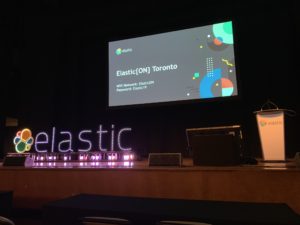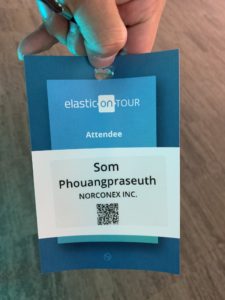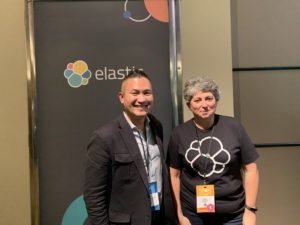This was my first year joining the open-road Elastic{ON} Tour 2019 event in Toronto on September 18, 2019. My experience at this event was fully charged with excitement from meeting with Elastic architects, operations folks, security pros, and developers alike.
The event was hosted at The Carlu in downtown Toronto. In the morning, the opening keynote was presented by Nick Drost, Senior Director of Elastic, on search solutions such as app search, site search, and enterprise search, security using SIEM, and more. One of the most exciting keynote updates was about using Elastic Cloud on Kubernetes to help simplify processes of deployment, security, scaling, upgrades, snapshots, and high availability.
 The next presenter, Michael Basnight, Software Engineer at Elastic, provided an Elastic Stack roadmap with demos of the latest and upcoming features. Kibana has added new capabilities to become much more than just the main user interface of Elastic Stack, with infrastructure and logs user interface. He introduced Fleet, which provides centralized config deployment, Beats monitoring, and upgrade management. Frozen indices allows for more index storage by having indices available and not taking up HEAP memory space until the indices are requested. Also, he provided highlights on Advanced Machine Learning analytics for outlier detection, supervised model training for regression and classification, and ingest prediction processor. Elasticsearch performance has increased by employing Weak AND (also called “WAND”), providing improvements as high as 3,700% to term search and improving other query types between 28% and 292%.
The next presenter, Michael Basnight, Software Engineer at Elastic, provided an Elastic Stack roadmap with demos of the latest and upcoming features. Kibana has added new capabilities to become much more than just the main user interface of Elastic Stack, with infrastructure and logs user interface. He introduced Fleet, which provides centralized config deployment, Beats monitoring, and upgrade management. Frozen indices allows for more index storage by having indices available and not taking up HEAP memory space until the indices are requested. Also, he provided highlights on Advanced Machine Learning analytics for outlier detection, supervised model training for regression and classification, and ingest prediction processor. Elasticsearch performance has increased by employing Weak AND (also called “WAND”), providing improvements as high as 3,700% to term search and improving other query types between 28% and 292%.
Another added feature to Elasticsearch stack is advanced scoring to help boost document query, using rank_features and distance_features. The new Geo UI uses map layers.
One of the most interesting new Beats to watch for is Functionbeat, which is a serverless data shipper that can subscribe to AWS SQS event topics and CloudWatch Logs, provisions the AWS Lambda function to ship data to Elasticsearch or Elastic Cloud Enterprise.
Elastic lightweight data shippers, Beats such as Filebeat for log files, Metricbeat for metrics, Packetbeat for network data, Winlogbeat for Windows event logs, Auditbeat for audit data, Heartbeat for uptime monitoring, and the latest Functionbeat for serverless shipper can be complemented with Norconex open-source products such as Norconex HTTP Collector or Norconex Filesystem Collector to crawl meta-data from the web or filesystem, then used with the open-source Norconex Elasticsearch Committer to push data to the Elasticsearch index, directly to Elastic Cloud Enterprise or the on-prem Elasticsearch Stack. Norconex can help with collecting meta-data from enterprise web architecture or enterprise filesystems for quick searching and to get relevant results.
Packed into the morning session, Jason Rhodes, Senior Software Engineer at Elastic, presented on unified observability, combining logs, metrics, and traces.
The afternoon session, Search for All with Elastic Enterprise Search and a Site Search demo and feature walkthrough, was presented by Diane Tetrault, Director of Product Marketing at Elastic. The latest UI gives the user the ability to configure content sources they search for and connect to their own data sources. Elastic Common Schema, introduced as an open-source specification, defines a common set of document fields for data ingested into Elasticsearch (https://www.elastic.co/blog/introducing-the-elastic-common-schema).
The Security with Elastic Stack session was presented by Neil Desai, Security Specialist at Elastic. He discussed the latest security capabilities to enable analysis automation to defend from cyber threats.
The Kibana and geo update features in Canvas and Elastic Maps were presented by Raya Fratkina, Kibana Team Lead at Elastic. Learning about ways to use these functionalities makes data more actionable.
I also learned tips at Elastic Architecture at Scale, a presentation by Artem Pogossian, Solutions Architect at Elastic. He discussed scaling from local laptops to multi-clusters and cross-clusters using case deployments.
A useful new feature in machine learning and analytics was introduced by Rich Collier, Solutions Architect and ML Specialist at Elastic. He demonstrated a use case using data frames, also called transforms, a feature that allows transformation of an existing index to a secondary, summarized index. Rich showed in a demo a possible use case from a digital retailer, using time series modeling to look for anomalies and forecasting in the shopper’s purchases, integrating Canvas UI designed in Kibana to build real-time data models. It was amazing to see the ability in demo to detect possible fraudulent purchases without having to be a data science expert.
Finally, after all these informational sessions, thanks to the Elastic event organizers for adding a closing happy hour, where I grabbed a drink with fellow attendees and Elastic folks. This was a great way to close a very extensive learning session. I look forward to being at the next year’s Elastic{ON} tour.




